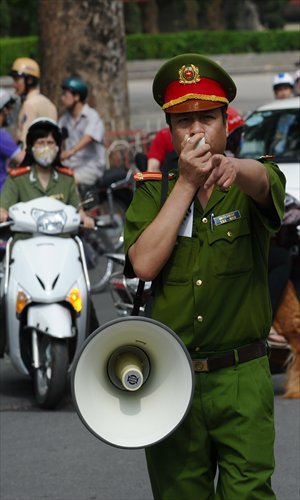4,000 Chinese await Vietnam evacuation

A policeman asks people to leave a street near the Chinese Embassy in Hanoi on Sunday. A call for further anti-China protests appeared to have fizzled out in the capital, with authorities deploying heavy security around the Chinese Embassy and other suspected protest sites. Photo: AFP
Vietnam's economy and tourism are expected to take a hit, as thousands of Chinese are being evacuated out of the country following Hanoi's failure to stop violence against Chinese nationals and companies.
The deadly riots in southern and central Vietnam, which killed two Chinese people and injured more than 100, drew protests from the Chinese government and a suspension of some bilateral exchange plans.
According to China's foreign ministry, three chartered planes Sunday flew more than 300 Chinese nationals from central Vietnam's Ha Tinh Province to Chengdu, Southwest China's Sichuan Province, including more than 100 injured in riots.
Most are workers for China Metallurgical Group Corporation (CMGC), a contractor for the construction of an iron and steel complex in Ha Tinh invested in by Taipei-based Formosa Plastics Group.
Before the Sunday evacuation, more than 3,000 Chinese people were evacuated, with nearly 4,000 more awaiting evacuation. The number is still increasing, Zhang Zhaoxiang, chief executive of CMGC, told China National Radio Sunday.
They will be taken back to China on five cruise liners, the first of which is expected to dock in Vietnam Monday morning, said the report. The five ships have a combined capacity of 5,000 passengers.
"China has raised the level of its travel warning for its citizens, advising them not to go to Vietnam for the time being and has suspended some bilateral exchange plans," Hong Lei, China's foreign ministry spokesperson, said in a Sunday statement, warning that further steps may be taken depending on the evolving situation.
The riots in industrial zones came amid rising tensions between the two sides over territorial disputes in the South China Sea after Vietnam slammed a Chinese oil company's launch of an oil rig in the waters of the Xisha Islands.
Some 400 factories were damaged and another 1,100 others were forced to shut down during looting and arson against foreign companies. Apart from those from the Chinese mainland, hundreds of Taiwan companies were also affected, along with South Korean, Japanese and Singaporean factories.
Ji Qiufeng, a professor of international relations at Nanjing University in Jiangsu Province, told the Global Times that suspension of bilateral exchange plans will work effectively as a countermeasure and China is likely to halt some border trade with Vietnam, while taking a firmer stand in the South China Sea.
"The protests in Vietnam are actually counterproductive. Vietnam has already shown its weakness as it has violated international law and it must make recompense to protect its image and reputation in the world. Any more unreasonable moves will only cause more damage to itself," Ji noted.
Following criticism over inaction to protect foreign nationals and firms, Hanoi tried to contain planned protests against China around the country over the weekend.
Vietnamese Prime Minister Nguyen Tan Dung said via text messages to citizens on Saturday that authorities had been ordered to "conduct concerted and determined measures not to allow illegal protests that cause security and social order disturbances," reported the Associated Press.
The China Business Association in Vietnam issued a notice Saturday, urging Chinese people to avoid going out over the weekend.
Wang Huijun, secretary-general of the association's branch in Ho Chi Minh City, said the association also discourages people from visiting busy and sensitive areas on Monday, which marks the 124th anniversary of the birth of late president Ho Chi Minh.
The security situation in Ho Chi Minh City remained stable as of Sunday afternoon, after some small-scale protests were halted by authorities, Wang told the Global Times.
Authorities in Hanoi cordoned off streets and a park close to the Chinese Embassy and pushed journalists and protesters away, reported the Associated Press.
"Vietnamese authorities demonstrated strict control of protesters this time. However, as a country relying heavily on foreign investments, previous riots have given global investors doubts as to whether Vietnam is as politically and economically stable as it previously was," Wang said.
Vietnam's abundant, cheap labor market attracted $21.6 billion in foreign direct investment in 2013, up from $16.3 billion the year earlier, according to government figures, AFP reported.
In addition to fears of capital flight, Vietnam's tourism is also expected to take a hit.
A Vietnamese tour guide in South China's Guangxi Zhuang Autonomous Region, which neighbors Vietnam, told the Global Times his business has been affected amid the protests as Chinese tourists dare not visit Vietnam.
Major Chinese travel agencies have suspended their Vietnam tour services.
Ctrip.com, a major online travel service provider in China, told the Xinhua News Agency Sunday that it has suggested that clients suspend any planned trips to Vietnam.
Other major agencies, including Caissa and China International Travel Service, have also suspended tours, reported Xinhua.
According to official data, Chinese tourists made 1.8 million visits to Vietnam in 2013.
Newspaper headline: Some bilateral exchange plans suspended